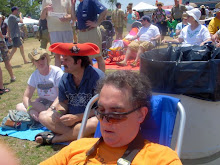It is amazing what the passage of time can do to the meaning of a word. Consider, for example, the simple word "jury." Article III, Sec. 2, the Sixth Amendment, and the Seventh Amendment all guarantee Americans the right to a jury in certain trial situations. And, clearly, the Founders had something specific in mind when they made these guarantees.
A panel of governmental employees wouldn't qualify as a jury. Or would it?
A panel of inquisitors certainly wouldn't qualify as a jury. Or would it?
A computer bank could not qualify as a jury. Or would it?
Of course, the answers to these questions all depend on what a jury IS. Yet, strangely, the jury reformers do not care what the historical meaning and role of a jury is. They want to write on a blank slate to create the "ideal" jury. Or at least, the closest to an "ideal" jury they believe they can get away with.
During the October ABA Jury Symposium, I asked the members of a panel chaired by Professor
Stephan Landsman, a jury historian and member of the ABA jury reform committee, whether the committee had considered historical norms in assessing their suggested reforms. The answer was resoundingly no. As a matter of fact, even Prof. Landsman seemed surprised anyone asked such a question. Yet to me, it goes to the very heart of the matter.
Clearly, the Founders had something specific in mind when they thought of trial by jury. They did not think of any panel of any number of people selected by any procedure deemed expedient. They had an image of an ideal jury in their mind - yet instead of attempting to stay true to this image, to perfect it, and to debate what it may have been from the historical record, we have allowed social scientists to play with the system, to re-invent it according to the results of their research.
I should point out that little of this research is even peer reviewed.
I will posit the following concepts, for consideration by readers:
1. Many of the problems with the jury system (lack of respect for juries, failure of people summonsed to jury duty to appear for service, dissatisfaction among jurors) are the fruits of past reforms. Through the years we have disempowered and "dumbed down" the jury. We have limited what can be argued to the jury, micromanaged them, and found every possible excuse (at least on the civil side) to take cases away from them. We have taken many turns in the wrong direction - so instead of reversing course, we have decided to turn to social scientists to blaze a new trail (new trial?). This untried, untested new trial is likely to be far bumpier than the experts are predicting. After all, remember the experts who described the war in Iraq as a "cakewalk?" This is a far more serious proposition, however, than a mere war: this is the American Jury System, a cornerstone of American democracy.
2. The American Jury System has existed for over 230 years. There is a lengthy historical record that can be studied to see what procedures have been applied over the decades, and how jurors have responded to them. We can see what worked, what didn't, what changed, and why. Must we not avail ourselves of that record as fully as possible before resorting to blind faith in the social scientists who would re-define the historical jury system nearly out of existence?
3. If we allow the jury system to be dramatically re-defined now, will it be re-re-defined in another five or ten years? How many dramatic re-definitions can it survive? Is a call for specialized training on the horizon? A call for a Juror's Union, or perhaps aptitude tests? Perhaps a "jury" should merely be a panel of government employees - Judges Light - or perhaps they should be specially trained fact-finders. Perhaps a computer connected to a polygraph machine (to test the witnesses) could be called the JURY (Justice User Resource for YOU). The computer could generate the questions AND test the witnesses, and be programmed with the law. (With a little work it could impose electric shock therapy to both punish AND rehabilitate criminals on the spot, as legal error would be impossible...)
Now, suggestion 3 ended on a creative note, but if anyone believes no social scientists or political scientists can be found who would applaud such a machine, they are incredibly naive. IF the sole job of a jury is to find the TRUTH, as the social scientist consensus runs, then there is no need for a lay jury of average citizens. A machine can do a much better job...
The ABA JURY PROJECT is headed down a slope that is far steeper and far more slippery than those intimately involved in it will admit - because they refuse to look at either their own fallibility or the fallibility of their disciplines. Let us be a little more humble. Let us trust in the wisdom of the Founders, and not in the wisdom of the statisticians, and let us return to their version of the Jury.
It is, after all, our legacy. We have failed in our duty to protect it, but the fact that it is tarnished is not enough to destroy its value. It can be polished right back up to its original condition and operation, with no more work -- and with far better results -- than those involved in its reinvention.
